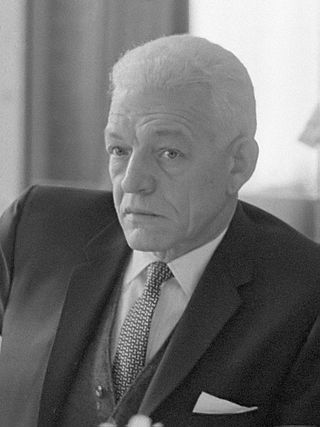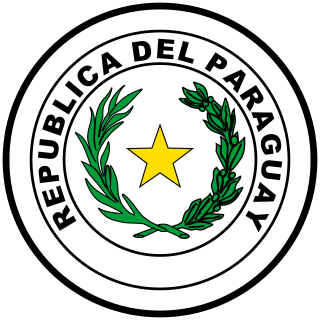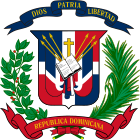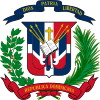
A constitution is the aggregate of fundamental principles or established precedents that constitute the legal basis of a polity, organization or other type of entity, and commonly determines how that entity is to be governed.

The Basic Law for the Federal Republic of Germany is the constitution of the Federal Republic of Germany.

The Dominican Republic is a representative democracy, where the President of the Dominican Republic functions as both the head of the government and head of the multi-party system. Executive power is exercised by the government. Legislative power is vested in the bicameral National Congress. The Judiciary is independent of the executive and the legislature.

The Constitution of the Republic of China is the fifth and current constitution of the Republic of China (ROC), ratified by the Kuomintang during the Constituent National Assembly session on 25 December 1946, in Nanjing, and adopted on 25 December 1947. The constitution, along with its Additional Articles, remains effective in ROC-controlled territories.

A constituent assembly is a body assembled for the purpose of drafting or revising a constitution. Members of a constituent assembly may be elected by popular vote, drawn by sortition, appointed, or some combination of these methods. Assemblies are typically considered distinct from a regular legislature, although members of the legislature may compose a significant number or all of its members. As the fundamental document constituting a state, a constitution cannot normally be modified or amended by the state's normal legislative procedures in some jurisdictions; instead a constitutional convention or a constituent assembly, the rules for which are normally laid down in the constitution, must be set up. A constituent assembly is usually set up for its specific purpose, which it carries out in a relatively short time, after which the assembly is dissolved. A constituent assembly is a form of representative democracy.

Juan Emilio Bosch y Gaviño was a Dominican politician, historian, writer, essayist, educator, and the first democratically elected president of the Dominican Republic for a brief time in 1963. Previously, he had been the leader of the Dominican opposition in exile to the dictatorial regime of Rafael Trujillo for over 25 years. To this day, he is remembered as an honest politician and regarded as one of the most prominent writers in Dominican literature. He founded both the Dominican Revolutionary Party (PRD) in 1939 and the Dominican Liberation Party (PLD) in 1973.

The president of the Dominican Republic is both the head of state and head of government of the Dominican Republic. The presidential system was established in 1844, following the proclamation of the republic during the Dominican War of Independence. The president of the Dominican Republic is styled Your Excellency, Mr. President during his time in office. His official residence is the National Palace.

The Constitution of the Republic of Lithuania defines the legal foundation for all laws passed in the Republic of Lithuania. The first constitution of the contemporary republic was enacted on 1 August 1922. The current constitution was adopted in a referendum on 25 October 1992.

The Congress of the Dominican Republic is the bicameral legislature of the government of the Dominican Republic, consisting of two houses, the Senate and the Chamber of Deputies. Both senators and deputies are chosen through direct election. There are no term limits for either chamber.

During its independent political history, Brazil has had seven constitutions. The most recent was ratified on October 5, 1988.
In political philosophy, limited government is the concept of a government limited in power. It is a key concept in the history of liberalism.

The present Constitution of Portugal was adopted in 1976 after the Carnation Revolution. It was preceded by a number of constitutions including the first one created in 1822, 1826, 1838, 1911, and 1933.
The Government of Meiji Japan was the government that was formed by politicians of the Satsuma Domain and Chōshū Domain in the 1860s. The Meiji government was the early government of the Empire of Japan.

The Constitution of the Democratic Republic of the Congo is the basic law governing the Democratic Republic of the Congo. The Constitution has been changed and/or replaced several times since its independence in 1960.

The Political Constitution of 1899, informally known as the Malolos Constitution, was the constitution of the First Philippine Republic. It was written by Felipe Calderón y Roca and Felipe Buencamino as an alternative to a pair of proposals to the Malolos Congress by Apolinario Mabini and Pedro Paterno. After a lengthy debate in the latter part of 1898, it was promulgated on January 21, 1899.

The Republic of Paraguay is governed under the constitution of 1992, which is the country's sixth since independence from Spain in 1811.
Constitutionalism is "a compound of ideas, attitudes, and patterns of behavior elaborating the principle that the authority of government derives from and is limited by a body of fundamental law".

Human rights in the Dominican Republic constitute the civil and political rights and freedoms legally protected under the Constitution of the Dominican Republic and enforced by the government through common and statutory law. The majority of human rights disputes are presided over by the highest court of constitutional appeal, the Dominican Constitutional Tribunal. These rights and freedoms have developed over time in accordance with the Dominican Republic's expansion from the former Spanish colony of the Captaincy General of Santo Domingo to its modern state formation. The history of human rights in the state have also been marked by the oscillation between democratic administrations, such as the current presidency of Danilo Medina, and authoritarian administrations, most significantly the dictatorial regime of Rafael Trujillo between 16 August 1930 and 16 August 1938. As a member of the Organization of American States and the United Nations, the Dominican Republic is party to myriad legal treaties and covenants which propagate the human rights standards of the international community and have integrated the majority of these human rights directives into their domestic legislation.
The 1963 Dominican coup d'état was a coup d'état that took place on 25 September 1963 against President Juan Bosch in the Dominican Republic. Juan Bosch had been the first democratically elected president after the assassination of the former dictator Rafael Trujillo but his policies faced criticism within from due to his policies, which were seen as leftist, which led to the coup that replaced his government with a military junta which itself would be replaced with a civilian junta.

Common good constitutionalism is a legal theory formulated by Harvard law professor Adrian Vermeule that asserts that "the central aim of the constitutional order is to promote good rule, not to 'protect liberty' as an end in itself". Vermeule describes it as an attempt to revive and develop the classical legal tradition by understanding enacted law as a positive application of background natural law principles. Within this tradition, he claims law is defined as "an ordinance of reason promulgated by political authorities for the common good." Vermeule states that law in this sense is "not tethered to particular written instruments of civil law or the will of the legislators who created them" but instead embody rational determinations of the common good, and it is those determinations, as well as the natural law background against which they are made, which constitute the law. Vermeule says that these principles include "a candid willingness to "legislate morality."
















